There are an established set of admission requirements for taking this Doctorate; these consider the previous studies taken by the students who access it. Thus, a distinction is made between prior training that provides direct access and other training that requires training supplements. Specifically:
A) Direct access to this Doctorate (without training supplements).
Those students who are in possession of any of the following masters will have direct access to the Doctorate:
- University Master's in Business Law and Agri-food Activity from UAL.
- University Master’s in Law and Local Administration from UAL.
- University Master's in Sustainable Local Development and Co-development from UAL.
- University Master's in Business Management from UAL.
- University Master's in Business Administration and Management from UPCT.
- University Master's in Management and Direction of Tourism Companies and Institutions from UPCT.
- Inter-university Master’s in Accounting and Corporate Finance (Inter-university UPCT with UAL).
- University Master's in Administration and Management of Organizations in the Social Economy from UPCT.
- University Master's in Labor Orientation and Intermediation (Inter-university UPCT with UMU).
- Inter-university Master’s in Local Development and Employment (Inter-university UPCT with UMU).
- University Master's in Business Administration (MBA) from UJA.
- Master’s in Land Transport Engineering and Logistics from UJA.
- Master’s in Economics and Territorial Development from UJA.
- Master’s in Marketing and Consumer Behavior (Inter-university between UJA and UGR).
- Master’s in Olives, Olive Oil and Health from UJA.
- Official Master's in "Automation and Remote Control for Water and Energy Resource Management ", coordinated by the Miguel Hernández de Elche University and UPCT.
- University Master’s in Advanced Techniques in Agricultural and Food Research and Development.
- Having completed an official Master's degree that is research-based, which the PhD Program’s Academic Committee recognizes as having related contents. In the case of having completed a mixed research-professionalizing Master's degree, the student must prove that he/she has completed an itinerary and a Master's final project (research).
Likewise, those students holding a Master’s in Advanced Studies from the preceding PhD Programs will have direct access to this PhD Program.
Given the inter-university nature of the study, the Academic Committee may establish and publish those new master's degrees that are considered appropriate for access.
B) Access with training supplements:
For those cases not contemplated in the previous section, the degree’s Academic Committee may decide that the student needs to complete training supplements, up to a maximum of 24 credits. These supplements will preferably be chosen from among the master's degree subjects indicated above that provide direct access, and which will preferably be taken during the first year of study, and in any event, before the end of the studies. Notwithstanding the provisions of the previous section, a detailed description for each research line is included in section 3.4 of the report.
Likewise, a set of admission criteria are established. Specifically, two preference criteria are considered:
- Students who come from Masters with direct access (indicated above) will have admission preference over the rest.
- Next, students who come from studies related to Economic, Business and Legal Sciences will be considered.
Similarly, the admission body will apply the following criteria:
- Average grade of the academic record (60%).
- Curriculum vitae. Previous research and teaching experience (20%).
- Scholarship or Contract link to the university (20%).
Part-time students: The admission requirements and criteria will be the same for full-time and part-time students, all of whom will have to establish and justify their commitment in the admission application.
Students with specific educational requirements derived from disability will have an academic advisor in the admission process who will assess their need for possible curricular adaptations, itineraries or alternative studies.








